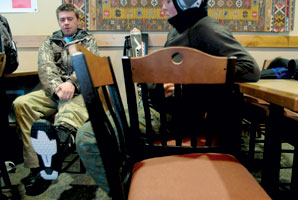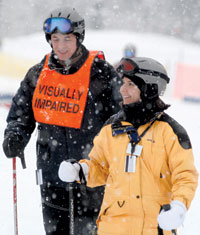WHITEFISH – There are purple hearts on the mountain today. Everywhere you look, there’s a war hero on skis or a snowboard, overcoming circumstances most of us will never know.
Each year, injured soldiers from the Wounded Warrior Project come to Whitefish Mountain Resort to ski and take part in the town’s winter festivities. On this particular morning, with fat snowflakes falling from the sky, there is a sense that the day will be just perfect. Zachary Hudson is happy to be here.
“The people of Whitefish, Montana – their generosity, their sincerity – has been overwhelming,” Hudson said.
Hudson, 26, told his story as he put on snowboarding gear at the resort’s Base Lodge last Friday. As a combat medic for the U.S. Army in Afghanistan, Hudson was injured twice in battle, in the shoulder and ankle. He received a Purple Heart and recovered from his injuries. While he handled shrapnel just fine, what he couldn’t deal with was coming home.
 |
|
Zachary Hudson, left, tightens his ski boot before hitting the slops with Jenny Cloutier, right, and other Wounded Warrior Project participants at Whitefish Mountain Resort. An Army combat medic, Hudson won a Purple Heart and Bronze Star with Valor while serving with the 10th Mountain Division. |
Upon returning to the U.S. in 2008, Hudson, who is from Alabama, discovered that readjusting into civilian life was difficult at best, utterly demoralizing at worst.
“It had to be probably the worst year of my life,” he said. “Adjustment was really hard.”
He began meeting with a counselor at a local veterans center and was told about the Wounded Warrior Project, which, according to its website, is a nonprofit organization whose mission is to “provide tangible support for the wounded and help them on the road to healing, both physically and mentally.”
Part of that road to healing is engaging in activities such as skiing at Whitefish Mountain Resort. With the help of adaptive instructors, soldiers with varying injuries are able to ski or snowboard at the resort.
Over the years, Wounded Warriors have arrived in Whitefish with injuries ranging from blindness and brain trauma to severe spinal damage and double amputations. In addition to the instruction, equipment – such as bi-skis with mounted seats – is provided.
This year’s Whitefish Wounded Warriors included Specialist Harold “Puck” Adams from Springfield, Ore., who sought snowy mountains to help him conquer post-traumatic stress disorder, brain trauma and problems in his back and knees. Michael Griffin of Carpentersville, Ill., received a Purple Heart after surviving multiple gunshots in Iraq. He was in town to ski with his wife.
Among the other Warriors were Specialist Johnnie Williams from Tampa, Fla., and Sergeant James “JP” Peacock from Comanche, Okla. Williams is a paraplegic after suffering a spinal cord injury in Iraq, but was still skiing alongside his wife. Peacock has PTSD, a traumatic brain injury and knee issues.
 |
|
Chief Warrant Officer Adam Stead, left, and his wife, Carrie Stead, head to the bottom of Chair 6 while skiing with fellow Wounded Warrior Project participants at Whitefish Mountain Resort. Adam is a helicopter pilot from the 101st and was shot while flying his attack helicopter in Afghanistan. |
Specialist Kevin Spangler, 26, of Shelbyville, Ill., said he was on top of a Humvee in Iraq when a rocket-propelled grenade hit the bottom of his gun mount, 13 inches away. Shrapnel lodged into the left side of his body and took away his ability to hear in that ear. His injuries did nothing to slow him down last week at the resort, where he was skiing with his wife.
“This whole thing is great,” Spangler said of the trip with the Wounded Warrior Project. “It’s very organized; more than I thought it would be.”
Adam Stead, 30, was a helicopter pilot in Afghanistan when he was injured during combat in 2009. He explains his injury succinctly: “I was shot in the head.”
“The bullet went through the other pilot’s leg and into my head,” Stead said. “I pretty much went unconscious. (The co-pilot) must have saw the ground coming quickly and he took control and got us down safely.”
Seven months later, doctors reversed their previous assessment and decided to surgically remove the bullet. Stead, who lives in Fort Campbell, Tenn., expressed gratitude for both the surgeon, who he called a “genius,” and the Wounded Warrior Project, which brought him to Whitefish on this perfect powder day. Hudson was similarly grateful.
“It’s an awesome organization,” Hudson said.